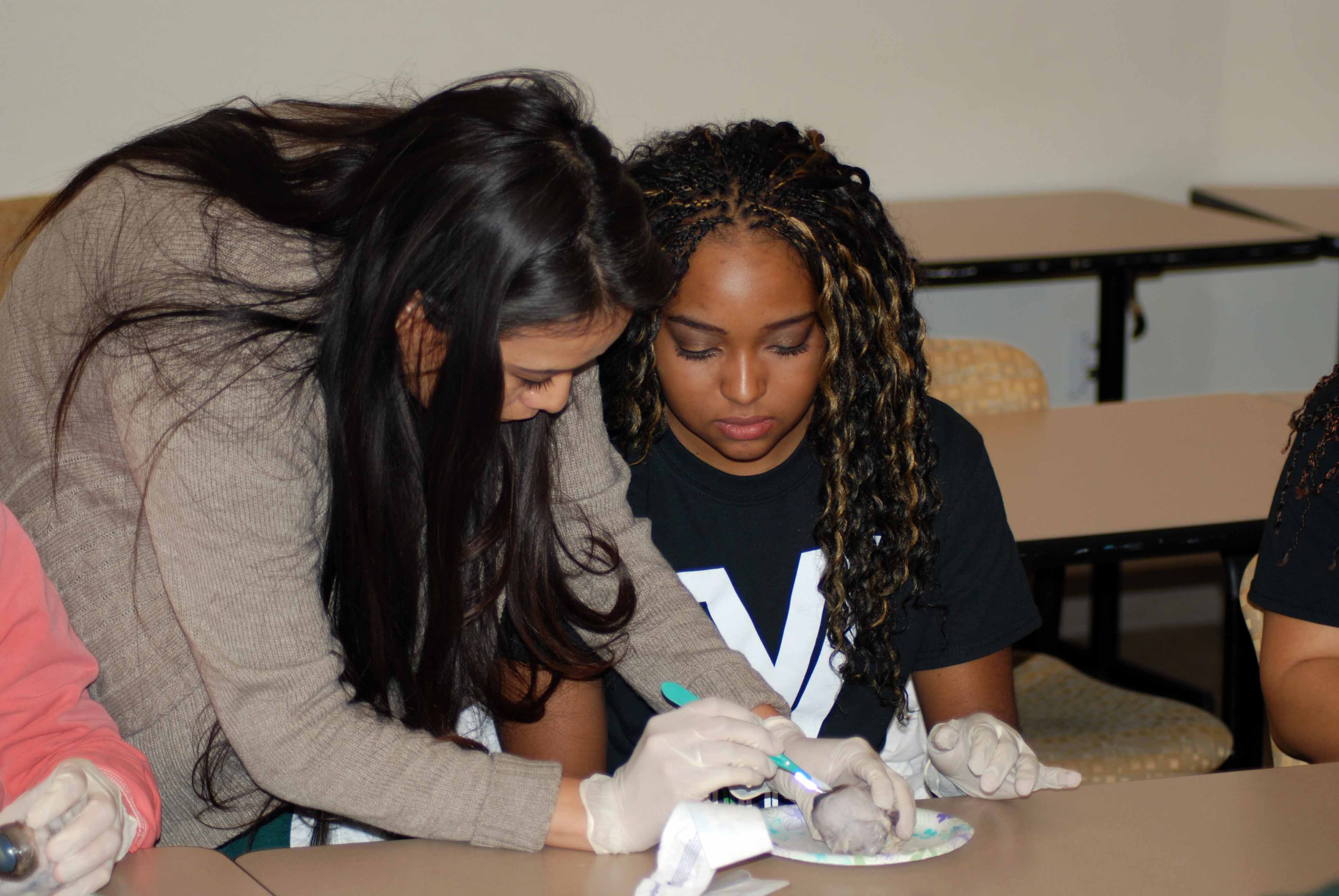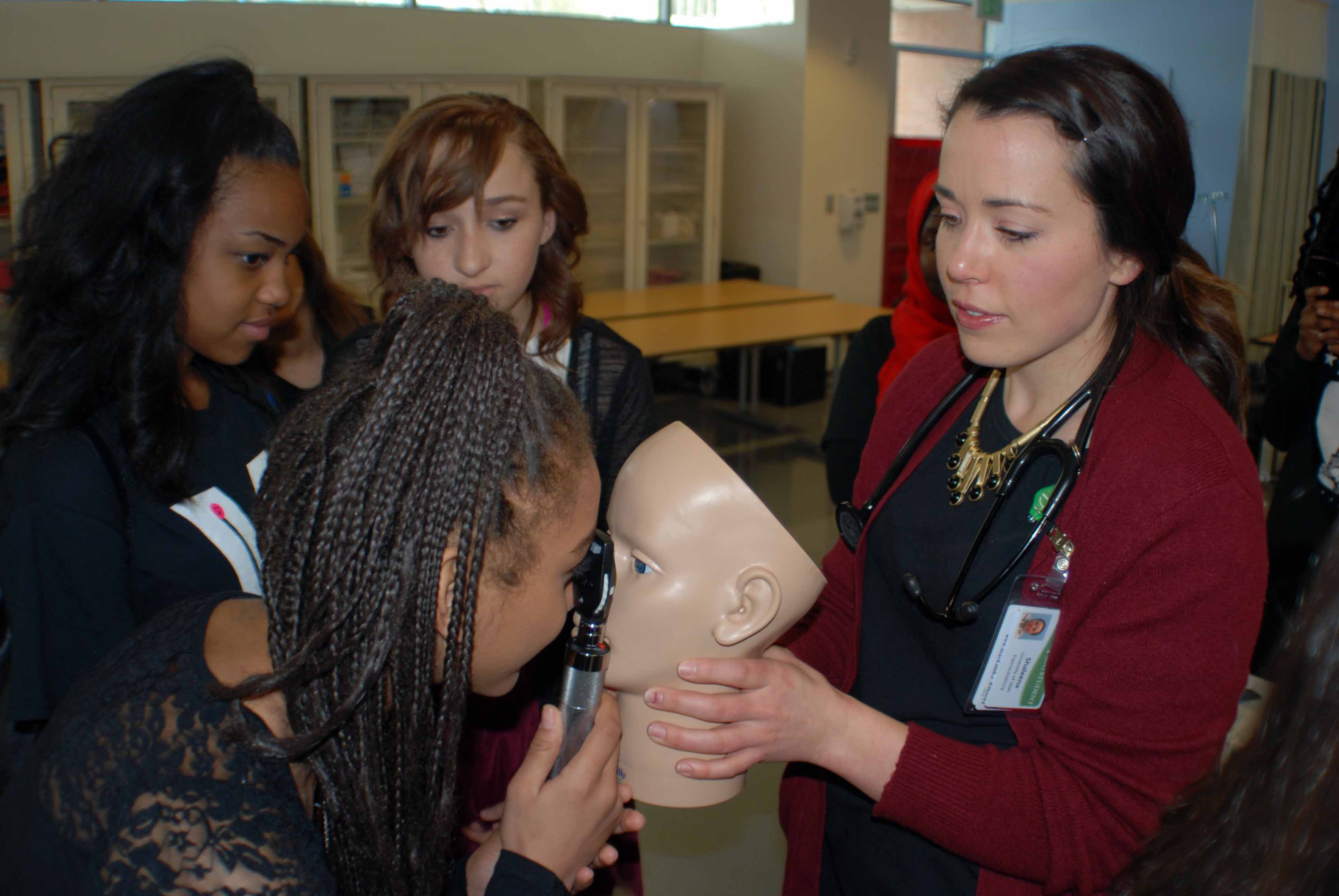
Donna Eldridge, an administrative program coordinator for the School of Medicine at the U, guides a student in delicate procedure dissecting an eyeball of a cow.
Healthcare professionals introduce students of The V(i)llage to ‘Medicine U’ at the University of Utah
By Albert C. Jones
America, The Diversity Place
SALT LAKE CITY — Students of The V(i)llage are from middle and secondary schools in the Salt Lake City and Davis districts. They have gathered in the School of Medicine’s Health Sciences Educational Building to attend a new program titled “Medicine U” on the campus of the University of Utah.
Dr. Elicia Williams-King, physician at the Veterans Administration Healthcare System in Salt Lake City, delivered an informative keynote, sharing cautionary experiences while guiding students on best practices that will get them into medical school. There was even a moment when she encouraged students to close their eyes and visualize what they want to be in life.
“One thing I want you to know that is important,” Williams-King said, showing a graphic. “Medicine needs you. We need you. This is what it looks like for the physician force in the United States from 1980 to 2012. We don’t have a lot of African American men or women or Latinos who are going into medicine.
“We absolutely need you,” she said, “and diversity so that we can bring into medicine our understanding how to talk with patients, how to approach certain issues, what we call in medicine cultural competency. It’s a term that we use because sometimes when we are talking to a patient from a different culture the way we approach medicine and talk about disease is different in that culture. We want to respect that culture. We don’t want to disrespect anyone.”
On February 12, hosts and healthcare professionals from the School of Medicine, College of Pharmacy and College of Nursing introduced students to the university’s academic offerings while inviting participation in hands-on activities. The Lassonde Entrepreneur Institute was represented by Anne Bastien, program manager, and four student presenters.
“We worked with The V(i)llage students last year,” Bastien said. “They are a good fit for us. We are happy to be part of Medicine U and look forward to building a pathway to the University of Utah for these students.”
Nedra L. Hotchkins, specialist for Women’s Enrollment Initiative at the U, is founder of The V(i)llage Initiative. The ever-growing program serves as a college leadership bridge for black students in three high schools and seven middle schools. The V(i)llage grew from about 100 students in its first year to its current number in year two.
“This is half of The V(i)llage,” Hotchkins said. “Unfortunately all of our children were unable to come. We currently have 250 students and this is about 120 students that we have here today.”
Her husband, Dr. Bryan K. Hotchkins, is a quantitative researcher at the U and curriculum designer for The V(i)llage. Parent-chaperones, student leaders from Westminster College, Utah Valley University and the U came as volunteers, as well as U staffers like Dr. Kamisha Johnson-Davis, medical director, clinical toxicology, at ARUP Laboratories and assistant professor in the School of Medicine.
Twanna Hodge came over to help from Marriott Library, where she is a resident and research assistant librarian. Hodge graduated from the University of the Virgin Islands and earned a Master of Library and Information Science in 2015 from the University of Washington, Seattle Campus.
Williams-King is also an adjunct assistant professor in Internal Medicine at the School of Medicine. She asked students what type of doctors they wanted to be? Responses returned include “orthopedic, anesthesiology, radiology and cardiothoracic surgery.”
“When you go off to college, as an undergraduate, you don’t have to major in a science,” she said. “You can major in anything that you want, whatever your passion is, whatever you are interested in, whatever you like. That’s what we want you to do. There are some prerequisites that you have to take. You have to take some biology, biochemistry, math classes, and some physics classes because you have to prepare to take a special test.”
An explanation of the MCAT (Medical College Admission Test) is given.
“The MCAT is very important,” Williams-King said, adding. “If you do well on the MCAT, you get to go on to medical school. There are many summer programs that are available to you for study to prepare to take the MCAT. Those kinds of classes are important to do. I did that. Then I went to the University of Texas Medical Branch at Galveston, which is where I am from.
“One of the things I want to go over is what you have to do if you are planning to go to medical school,” she said. “One thing is do well in school. Right now, doing the best you can and learning as much as you can is important. The trigonometry and calculus you may take builds on the algebra that you took before. It’s important to do well in passing math. It’s important to do that.”
Williams-King studied at five undergraduate institutions on the way to earning a Bachelor of Science in biochemistry from Texas A&M University. Medical degree was earned at University of Texas Medical Branch. Residency and internship followed at Christus St. Joseph Hospital in Houston and Cambridge Hospital in the Boston area.
“What I want you to do is dream a little bit, dream bigger,” she said. “Even when you have dreams you recognize that there is not always going to be someone there to support you. One story that I talk about is when I was in high school. In my senior year, I was doing pretty well. The principal of the school asked for me and my parents to come to his office. I was surprised because I had never been in the principal’s office.
“The principal started to talk about they were concerned about my safety and they wanted to make some changes,” Williams-King recalled. “My high school was predominantly white. It was about 30 percent minority. Usually what most high schools do, if you have the highest GPA (grade point average), you graduate valedictorian. And if you have the second highest, you graduate as salutatorian. That was done at my high school decades before I was going to graduate. The principal said, ‘I think for your safety this year we are going to change it. The top two people to graduate will be co- valedictorians.’ I was, of course, shocked. I said what? My dad stood up and said, ‘Absolutely not.’ My mom stood up and said, ‘Let’s go.’
Her parents told her to remain focused on being a good student and then garnered support from groups in the community.
“Unfortunately that year there was a major discussion over whether they should change how to decide the valedictorian of our high school,” Williams-King said. “Unfortunately things like this happen. And unfortunately when they do happen, you are not alone.
“Needless to say,” she told students, “after months of that, I did graduate as the first black valedictorian of my high school. Unfortunately that kind of mistreatment still continues in the United States, but we are not going to let that kind of treatment stop us. We can do what we have to do because there are people who can help us. That is what is important about The V(i)llage, too, because you can learn about another part of going into medicine or any field that you want to go into and that is called networking. That’s basically called determining a mentor.”
Students are guided on the importance of choosing a mentor.
“What I want you to do is find someone who will encourage you,” Williams-King said. “That’s important. Your mentor can be anyone. That person doesn’t necessarily have to be a doctor. If you want your mentor to be a doctor, you need to go in with a plan. And it’s helpful if you come in on time. As doctors, we are seeing patients all day and we are trying to see people in between those times. You can sometime come in and shadow a person, see if you like what that person is doing. This is something you can do even now. Nurse or pharmacist, it is helpful to find a mentor in that area and shadow a person.”
Returning to an earlier point, she cautions students to be aware.
“The last deed I have here is to tell you basically dig in deeper,” she said. “And what I mean by that, we talk about having a mentor. Unfortunately, we have people who are what I call ‘anti-mentors.’ These are the people who are discouraging. These are the people who say, ‘Oh, you want to be a nurse or a doctor? Maybe you should do something else.’ Sometimes you have to stand up for what you want to do and what you are interested in and not let someone else tell you what you should do.
“Be aware that anti-mentors do exist,” Williams-King said. “Don’t confuse them with someone who is giving you what I call constructive criticism. It’s important for someone to tell you the truth. If you are making all ‘C’s’ in college, you are not going to get into medical school. If someone tells you that, it is actually the truth. Want you to know that to see if you can fix it — how can you make ‘A’s’ and ‘B’s.’ You don’t need to make straight ‘A’s,’ but you need to show ‘A’s’ and ‘B’s’.’ The reason you do all that is because medical school is not easy. When I was in medical school, I had all my tests on one day. We would basically the week before that study 12 to 14 hours a day.
“The reason why medical school is so important is that we work with people,” she said. “We figure out what is wrong and then we try to help that person get better, get back to their baseline. It’s such an important field. That’s why it is important to know how to study and know methods to study. It’s important to prepare as best as you can. Sometimes you have to dig in deep. Sometimes I talk about visualizing what you want.”
The 120 students were divided in groups of four, rotating between four workshops. Hailey Leek, field trip coordinator in the Office of Undergraduate Studies, shepherded a group of students among workshops.
Donna Eldridge, an administrative program coordinator for the School of Medicine, led students through a medical procedure. Safety instructions given, each student, surgical scalpel in hand, dissected eyeballs of a cow.
Sean Distance, Jayden James, Fernando Herrera, Liz Morales and Heath Fenchi introduced academic programs offered by the Lassonde Entrepreneur Institute.
In the pharmacy compounding lab, Danielle Keddington, alumni relations development, instructed students in measuring and weighing ingredients to make lip balm. Emilee Boyden, paraprofessional at NWMS, led students, including Ido, Fatuma, Maryn, Alicia, Dajah, Tana and Shelayah, to the compounding lab.
“They did great helping each other,” Keddington said. “Everyone followed instructions well and now they get to take home their own chap stick.”
In the simulation lab, a couple dozen adult-sized manikins lay on hospital beds ready to be examined by prospective nurses. Dr. Sara E Hart, professor of clinical nursing, led the workshop with assistance from first semester nursing students Shaleena Young, Ben Daut and Olivia King, among others.

The V(i)llage middle school students receive instruction in simulation lab from Shaleena Young, first semester student in the College of Nursing at the University of Utah.